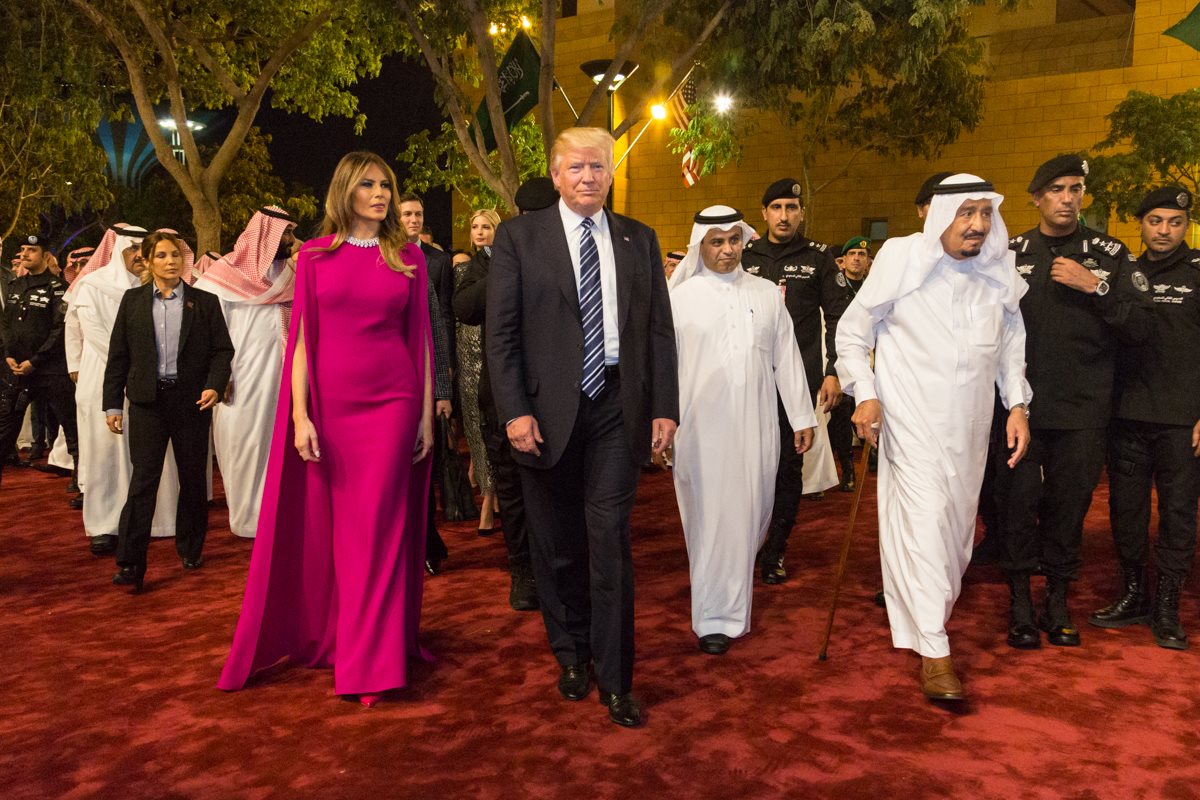by Adam Johnson
The Trump administration wrapped up a weapons deal with the Saudi Arabian government this week that will be worth up to $350 billion over the next ten years. News of the deal came as Trump visited Riyadh and paid fealty to one of the United States’ most enduring allies in the Middle East.
The vast majority of the reports on the topic, however, omitted a rather key piece of context—namely, whom the weapons will be used to kill.
The famine and brutal two-year-long war in Yemen being waged by the Saudis that has killed over 10,000 civilians wasn’t mentioned once in reports of the $300 billion deal to Saudi Arabia by CNN (5/19/17, 5/20/17), Washington Post (5/19/17), The Independent (5/19/17), New York Daily News (5/20/17), CNBC (5/20/17, 5/22/17), CBS News (5/20/17), Business Insider (5/20/17), Time (5/20/17), Fox News (5/20/17), Reuters (5/20/17), ABC News (5/20/17), Fortune Magazine (5/20/17) or Chicago Tribune (5/20/17).
The arms deal was typically framed in vague “security” terms, with an emphasis on Saudi Arabia’s role in fighting “terrorism” (e.g., “The White House says the package includes defense equipment… to help the Arab nation and the rest of the Gulf region fight against terrorism”—Fox News, 5/20/17), despite the fact that the bulk of its military activity is focused on bombing Shia Houthi rebels in Yemen that have nothing to do with terrorism as such.
Indeed the head of Al Qaeda in the Arabian Peninsula claimed earlier this month his forces were “fighting alongside” the Saudi-backed Yemeni government. This detail was also omitted from reports on the arms deal, presumably because it would messy up the “Saudi Arabia–as–partner–in–War on Terror” narrative the press was uncritically echoing.
In his report on the arms deal, the Washington Post’s Steven Mufson (5/21/17) got quotes from the CEO of Lockheed Martin and reps from General Electric and private-equity firm Blackstone, but found no time to interview a human rights expert or aid worker or victim of Saudi bombing of Yemen; indeed, that bombing wasn’t even mentioned. Likewise, CNBC (5/22/17) issued a sexed-up press release Monday morning about how “defense stocks soar to all-time highs on $110 billion US/Saudi Arabia weapons deal”—with no mention of whom, exactly, said weapons were killing.
Many outlets went with the “jobs” frame, echoing the White House narrative that the selling of arms to a dictatorship waging a brutal war on a neighboring country was, in fact, good because it “created jobs.”
“Trump Says Arms Deal He Signed With Saudi Arabia Will Create Jobs,” was the NPR headline (5/20/17). “Trump Says Saudi Arabia Deal Will Create ‘Jobs, Jobs, Jobs,’” CBS Miami (5/20/17) reported. Neither of these reports used the words “Yemen” or “bombing” or “famine.”
To the extent the Saudi bombing of Yemen was gestured at, it was in vague, Risk game–like terms about how Saudi Arabia was a “check” against “Iranian aggression”—an opaque framing that reduces all Shia populations in the Middle East into mindless Iranian drones in urgent need of an application of Saudi munitions.
“The United States likes to see Saudi Arabia with a strong military because it is seen as a counter to the forces of Iran,” CNN Newsroom (5/20/17) euphemistically explained. It’s not spelled out that “counter” here means bombing one of the poorest countries on earth for over two years, unleashing what the UN calls “famine-like” conditions affecting nearly 7 million people.
In stark contrast, reports in US media of Russian arms sales to the Assad government in Syria—even before Russia directly entered the war in September 2015—would always mention the stakes of the deals in terms of human life. Weapons sales by other countries are put in clear moral terms—as they should be. Those by the United States are sterilized, rendered abstract by omitting the deaths that will inevitably result.
The New York Times (5/15/17) did mention the famine and war in Yemen in the context of the arms deal last week, but one article on the subject from Thursday (5/18/17), for unknown reasons, removed this passage expressly noting the Saudis’ history of buying US weapons:
The Saudis have spent a fortune on US weapons over the years, and a series of new deals that could be worth more than $300 billion over the next decade are close to completion, Reuters reported this month.
You can see the original, as reprinted in the Boston Globe, here.
As of Monday afternoon, no major newspaper—New York Times, Washington Post, Wall Street Journal, USA Today, LA Times, Chicago Tribune or Daily News—has run an editorial condemning Trump for cozying up with and selling massive amounts of arms to the Saudi dictatorship. As FAIR noted last week (5/17/17), this outrage remains solely directed at dictatorships not in good standing with the US State Department.
Such is most reporting on the US’s relationship with Saudi Arabia. The human rights framework so much of the pundit class lives by—the moral positioning that gives the US the unique right to interfere in conflicts throughout the globe—is suddenly, and without explanation, suspended. The US backs Saudi war crimes despite their brutality, never because of it. It sells arms in hopes they will reform, never because they have.
And unlike our enemies, no one in particular is responsible. No “Salman regime did X,” no “forces loyal to Salman regime bombed Y.” Saudi Arabia remains a game of moral hot potato, no one is to blame and, somehow, everyone is a reformer.
Adam Johnson is a contributing analyst for FAIR.org. Reprinted, with permission, from FAIR. Official White House photo by Shealah Craighead.






The massive sophisticated arms deal and the US President shamelessly branding Iran as the ‘origin’ of ‘terrorism’ that the Sunni Arab world should unit to confront, explicitly pave the way for another US proxy war, similar to what we had experienced during Saddam’s military invasion and chemical attacks, with the US President Ronald Reagan being fully complicit in the war crime. And now we should be expecting another US proxy war against us.
Three weeks before the $110 billion arms deal, the Saudi Deputy Crown Prince Mohammed bin Salman had threatened Iran: “We will not wait until the battle comes to Saudi but we will work to have the battle in Iran rather in Saudi Arabia”. Certainly he had the full details of the arms deal to speak with such confidence before Trump’s arrival; and $110 billion arms are not intended to fight ISIS or the poor in Yemen: the aim is to bring war to Iran.
Given the assassination of the Iranian scientists and the cyber-attacks by Israel and America – moralised in the name of ‘self-defence’ in the face of an imaginary ‘existential threat’ – should we now faced with this real, and publicly declared ‘existential threat’, should we opt for the civilized world’s self-justification and attack the Saudis in the name of ‘self-defence’, or should we wait until the Saudis receive their massive arms to savagely attack us in Iran with the US blessing?
Trump wonders why so many Iranians shout ‘Death to America!’ Has America given us any reason to think otherwise? Shame on you America! Shame! Shame! Trump’s speech, his jokes and fascination with the American arms, money and mass murder exposed the truth of American culture, conveyed better than any other US President in history.
Will the Saudis at least PAY for their arms, unlike Israel?